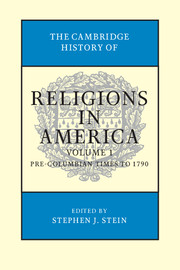Book contents
- Frontmatter
- Contents
- Contributors
- Editor's Introduction
- SECTION I BACKGROUND ON RELIGIOUS TRADITIONS – PRE-1500S
- SECTION II RELIGIONS IN THE POST-COLUMBIAN NEW WORLD – 1500–1680S
- SECTION III RELIGIOUS PATTERNS IN COLONIAL AMERICA – 1680S–1730S
- SECTION IV RELIGIOUS DIVERSITY IN BRITISH AMERICA – 1730S–1790
- 17 Religious Ferment among Eastern Algonquians and Their Neighbors in the Eighteenth Century
- 18 African Slave Religions, 1400–1790
- 19 Colonial Judaism
- 20 Roman Catholicism in the English North American Colonies, 1634–1776
- 21 Anglicanism and Its Discontents: Protestant Diversity and Disestablishment in British America
- 22 Protestant Evangelicalism in Eighteenth-Century America
- 23 Sectarian Communities: Religious Diversity in British America, 1730–1790
- 24 Liberal Religious Movements and the Enlightenment
- 25 Folk Magic and Religion in British North America
- SECTION V AMERICAN RELIGIONS IN THE EIGHTEENTH-CENTURY INTERNATIONAL CONTEXT
- SECTION VI THEMATIC ESSAYS
- Index
- References
22 - Protestant Evangelicalism in Eighteenth-Century America
from SECTION IV - RELIGIOUS DIVERSITY IN BRITISH AMERICA – 1730S–1790
Published online by Cambridge University Press: 28 July 2012
- Frontmatter
- Contents
- Contributors
- Editor's Introduction
- SECTION I BACKGROUND ON RELIGIOUS TRADITIONS – PRE-1500S
- SECTION II RELIGIONS IN THE POST-COLUMBIAN NEW WORLD – 1500–1680S
- SECTION III RELIGIOUS PATTERNS IN COLONIAL AMERICA – 1680S–1730S
- SECTION IV RELIGIOUS DIVERSITY IN BRITISH AMERICA – 1730S–1790
- 17 Religious Ferment among Eastern Algonquians and Their Neighbors in the Eighteenth Century
- 18 African Slave Religions, 1400–1790
- 19 Colonial Judaism
- 20 Roman Catholicism in the English North American Colonies, 1634–1776
- 21 Anglicanism and Its Discontents: Protestant Diversity and Disestablishment in British America
- 22 Protestant Evangelicalism in Eighteenth-Century America
- 23 Sectarian Communities: Religious Diversity in British America, 1730–1790
- 24 Liberal Religious Movements and the Enlightenment
- 25 Folk Magic and Religion in British North America
- SECTION V AMERICAN RELIGIONS IN THE EIGHTEENTH-CENTURY INTERNATIONAL CONTEXT
- SECTION VI THEMATIC ESSAYS
- Index
- References
Summary
On the eve of the American Revolution, Mary Cooper was a fifty-four-year-old farm woman living in Oyster Bay, Long Island, in the colony of New York. Her life, as revealed in staccato entries in her diary, was hard. She constantly struggled to manage the demands of farm and domestic life and hopelessly watched as her daughter's marriage disintegrated. Winter was, of course, the hardest season on Long Island. Typical was an entry from March 1769. “Extreeme high wind. Cold. Freeses all day long. O, I am tired almost to death, dirty and distressed.” In her dark moments, Cooper found comfort – fleeting though it might have been – in her faith, and in a new congregation of saints she had recently discovered and joined. Although Cooper came from a traditional Anglican background, this church was like none she had ever seen before. African Americans, Native Americans, and women all not only participated actively in her New Light meeting, but often exhorted and preached sermons. Almost the only joy in her diary was associated with the new, exciting church. She often commented that the redeemed, motley community had a “happy meeten.” Occasionally in those meetings she even experienced “heavenly tranceports” of spiritual ecstasy herself.
- Type
- Chapter
- Information
- The Cambridge History of Religions in America , pp. 451 - 466Publisher: Cambridge University PressPrint publication year: 2000

